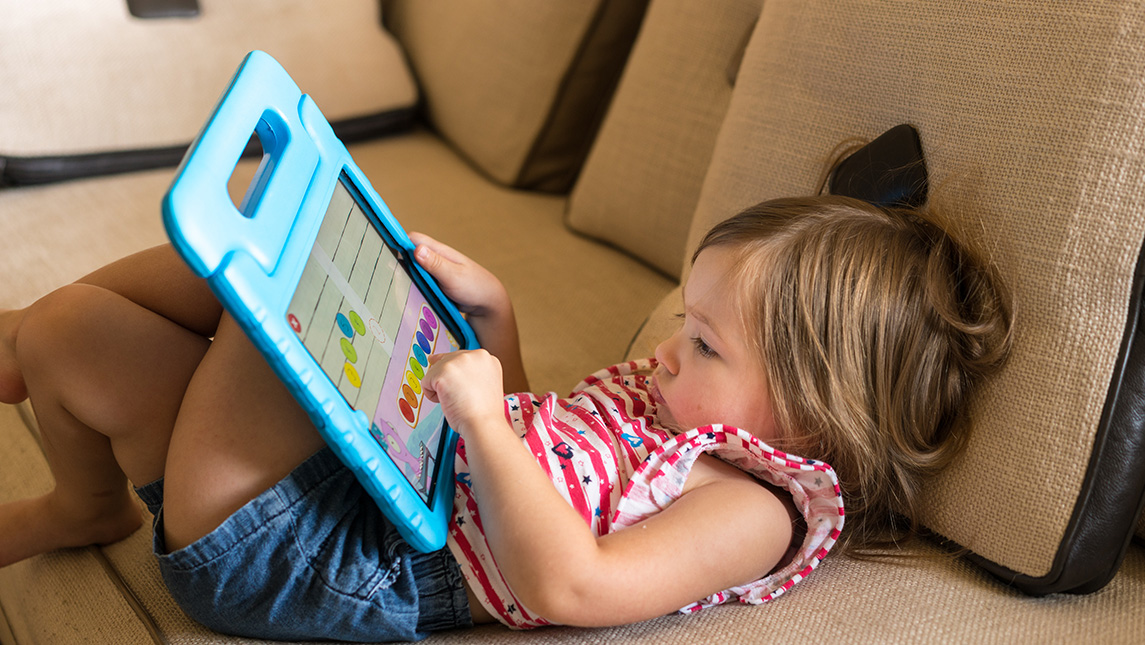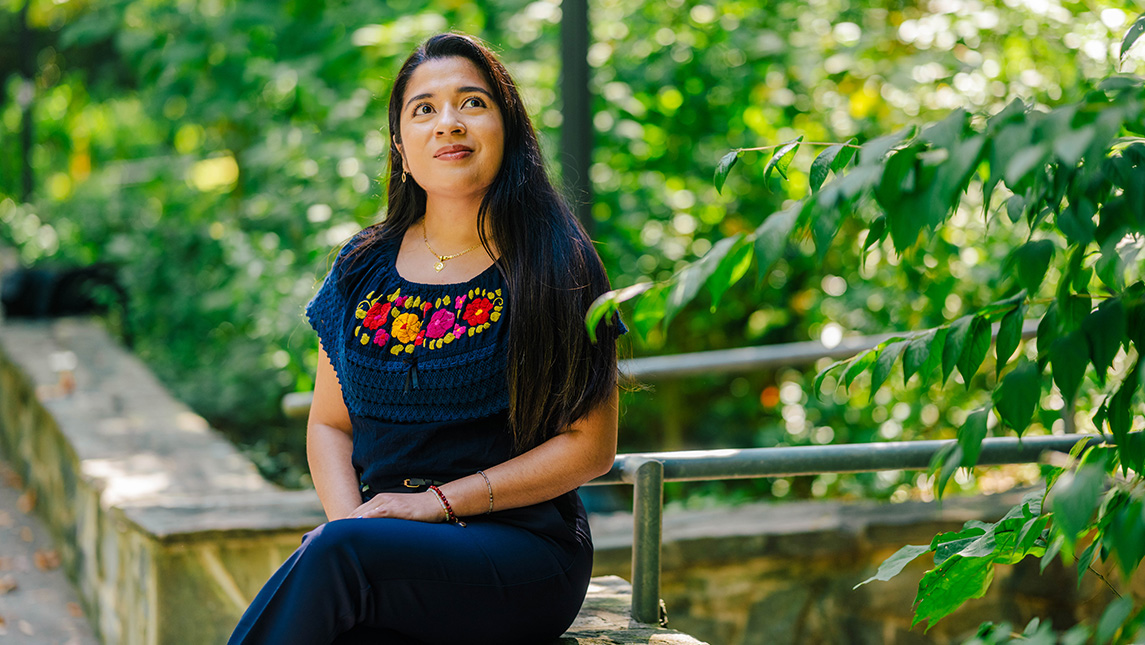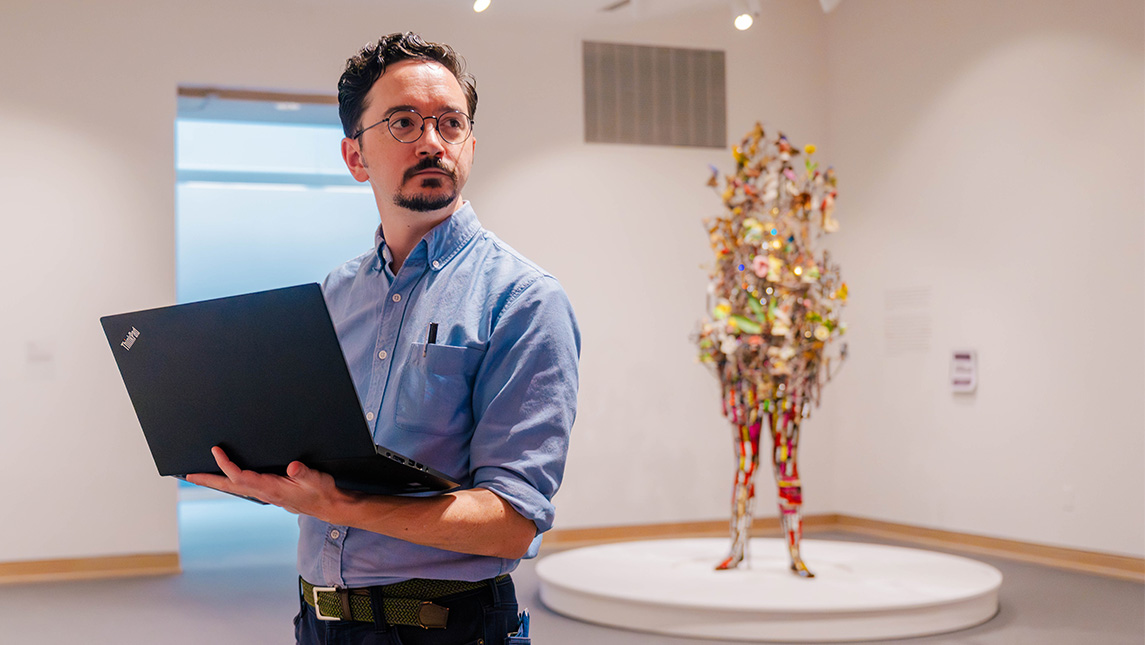Google “screen time for preschoolers,” and you will be hit with an onslaught of articles about behavioral problems, ADHD, or learning difficulties. Search a parenting forum for advice, and you will get an eyeful of anecdotes and admonitions. Parents may have read the American Academy of Pediatrics (AAP)’s recommended time limits, but in practice, it’s hard to pry that tablet out of their kid’s hands when it’s keeping them distracted as dinner needs to be made.
And as most Americans of all ages spend their whole day with a screen in their pocket, parents may feel it’s harder than ever to enforce good digital habits.

The discussion interests people like UNC Greensboro’s Jessica Caporaso ’16 M.A. ’21 Ph.D. She sees it from many perspectives – as an academic professional assistant professor in the Department of Psychology, as a researcher studying how preschoolers develop self-regulatory skills and peer relationships, and as a mother.
“I have a 6-year-old and a 3-year-old,” she says. “We definitely have screen time at my house.”
Headlines only tell so much; Caporaso says many of the touted studies are far more limited in scope once you break down the data and research methods. “We might see a small effect that more screen time predicts a ‘negative’ outcome,” she explains. “But there’s always a ‘however.’ It may be an excessive amount of screen time, or without a balance of other activities, or the parents are not that involved, so on and so forth.”
She takes a deeper dive into how screens affect children’s mental health and how parents can make the right call.
Are kids really learning from what they see on screens?
That depends on the age, especially when it comes to language. “Any kid two years old or younger is not going to pick up language from screens,” says Caporaso. “Even if they’re sitting next to a cup, and Ms. Rachel says, ‘This is a cup,’ they’re not able to map the cup on the screen onto the cup next to them.”
That changes once they develop symbolic capacity by the age of three, she says. “Older research has looked at children learning vocabulary from ‘Sesame Street’ and similar TV shows. Those kids are able to map what they’re seeing on the screen to real life.”
Screen time may present an issue, according to Caporaso, if it replaces direct interaction with the parent. “We’re talking about excessive amounts of technology use,” she says. “An hour of screen time after school is not going to disrupt normal parent-child dynamics. But if kids are always on their tablets while parents are always on their phones, that could impact the amount of time parents talk with their kids.”
One thing to consider, she says, is that there are different types of screening: passive (watching a TV show or a movie) and active (playing games or puzzle activities). Headlines often lump those together, but watching a movie, using an activity app, and browsing social media engage children in different ways.
“We see with primary school-aged kids that certain games like Minecraft foster creativity or independent problem solving,” she says.

Do screens cause behavioral problems?
Research into preschoolers’ screen use often overlaps with Caporaso’s field of developmental psychology. At that age, children are developing key psychological skills such as executive function, emotion regulation, and attention regulation. They need to make good life decisions and work well with others.
Caporaso is well aware of claims that screen time leads to behavioral problems. Many of those are mentioned in a 2022 meta-analysis of 87 studies on the longitudinal effect of screen time on kids. The meta-analysis shows that the effect itself is small, meaning that screen time has a limited contribution to later behavioral problems. Some of that research did not use controls to find whether the emotional problems originated with the screens, or whether the children already had issues.


“A screen might exacerbate a problem if parents use the screen as an emotion-regulation tool,” she says. “Other studies show that. If a 4-year-old has really explosive emotions, lots of tantrums, and the main way their parents or providers calm them down is putting them in front of a screen, then they’re not learning how to regulate those strong feelings without the screen.”
So, what about kids throwing tantrums when the screens are taken away? Caporaso points out that at this age, children are still developing self-regulation of their behavior; they haven’t yet learned how to step away from any activity that pleases them. Caregivers can foster these skills around the use of screens. “If your child has a really hard time putting it down, you can set a routine, use visual timers, and give reminders,” she suggests.
Finally, there is a difference between an immediate effect and a long-term effect. Parents may notice a dip in their child’s attention when they watch TV. But that does not mean they will develop ADHD or experience regulation difficulties later in life.
How can parents use screen time wisely?
As with most things in life, Caporaso says that moderation is key. “Part of learning regulation is to have it be part of a healthy lifestyle balanced with other activities.”
She offers a few nuggets of advice:
- Do not allow unfettered access. Set time limits and house rules, such as asking permission before turning on the TV. Use parental controls to restrict what content the kids see. “Especially with YouTube,” she cautions. “Their algorithm can give kids some weird things.”
- Watch with your kids. Caporaso says there are many positive effects for children seeing their caregivers react to the media alongside them. “For example, back to ‘Ms. Rachel,’ if your child is trying to learn vocabulary, you can repeat and reiterate what Ms. Rachel says and give praise if they repeat the word.”
- Encourage active screen time. Parents can find learning apps with age-appropriate puzzles. “Just learning how to move their finger on the tablet to make something move onscreen,” says Caporaso. “We wouldn’t think of it as problem-solving, but it is for a 2-year-old.”
Sowing seeds for safe screen habits later in life
Screen time for youngsters is far from the only hurdle that parents will face when raising their kids. UNCG psychology researchers are at the forefront of studying the ramifications, from time spent on phones to mothers’ impact on body image.
Caporaso reminds parents that kids will be expected to use screens when they get older, and then new fears take hold: peer pressure on social media, online bullying, sedentary lifestyles, and online predators.


By building a healthy attitude around screens at an early age, parents lay the groundwork for positive habits once their kids become old enough to use technology without adult supervision.
As a mother, Caporaso understands that family life is busy and often chaotic. Using screens intentionally can help both the parent and child. “If you’re using technology as a babysitter, that’s not good,” she says. “But if the kids are off from school, or it’s a weekend, and you have a lot of stuff to get done around the house, and they watch a movie or two, that’s fine. Again, in moderation, parents shouldn’t feel guilty at all.”
Story by Janet Imrick, University Communications
Photography courtesy of Adobe Stock and Jessica Caporaso, Department of Psychology















